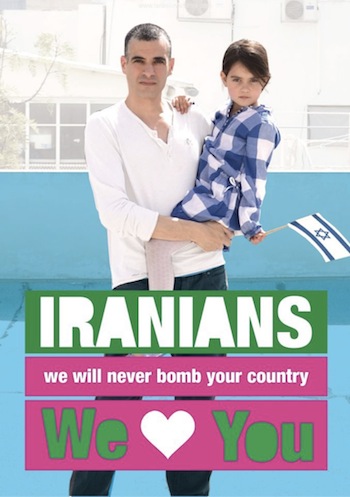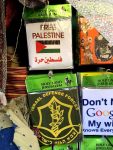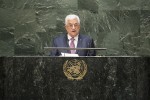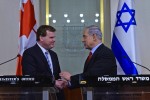The Peace Factory founders Joana Osman and Ronny Edry spoke at the University of British Columbia on Feb. 6. (photo by Zach Sagorin)
“Israel loves Iran,” “Palestine loves Israel,” “Israel loves Palestine,” “Iran loves Israel & Palestine.” The Peace Factory uses social media to connect people in the Middle East, to build relationships and see one another as human beings with visions of peace.
“People may not like the idea of inclusion, the idea of welcoming everyone, but that’s why we are here – to invite those people to learn about the various cultures and faiths that are around us,” said Shem Arce when introducing the Active Community Dialogue (ACD) event Make a Friend, Make Peace. “With some dialogue and understanding we can create a community for everyone – no matter their religion, culture or ethnic background.”
Arce, a University of British Columbia film studies student from Mexico, recently began ACD with the goal of combating discrimination through meaningful, respectful dialogue and interactions.
ACD’s Make a Friend, Make Peace event on Feb. 6 featured a presentation from the founders of the Peace Factory: Ronny Edry, an Israeli graphic designer living in Tel Aviv, and Joana Osman, a Palestinian living in Munich. The pair also spoke at King David High School.

The UBC event drew dozens of people, and Edry showed the crowd a poster he uploaded to Facebook in 2012, when Israeli Prime Minister Binyamin Netanyahu “was calling for preemptive strike on Iran,” when “it was quite stressing.”
The graphic designer decided to send something else to Iran. He designed a brightly coloured poster with a photo of him holding his daughter and bold text declaring, “Iranians / we will never bomb your country / We ♥ You.” Edry told the audience that the “five first comments were ‘delete it’” but, after leaving the poster online, he was surprised to find that “Iranians were commenting on the picture” and a line of communication was created.
“If something works, do it again,” said Edry. Soon, he added, “a lot of Iranians and Israelis started having a conversation.”
Interestingly, the security guard of the ACD event, an Iranian-Canadian man, had participated in the Peace Factory movement.
“When you don’t know someone and you close your eyes and think of the enemy, you end up thinking of some kind of monster,” said Edry. In Israel, “most of the time on the TV, they won’t show you the nice people of Iran.”
But, after starting the “Israel loves Iran” campaign, Edry received pictures from Iranians wanting to join. The movement has enabled many Iranians and Israelis to connect and build friendships online. And it continues to grow, with more than 121,000 likes and more than one million unique visitors each week to the “Israel loves Iran” Facebook page and more than two million views of Edry’s Ted Talk. The movement is continuing, with “both sides sharing stories and pictures of themselves,” said Edry.
With the success of “Israel loves Iran,” Edry said people were “coming up to me and saying, ‘Why don’t you do the same campaign with the Palestinians?’”
Soon after, Osman founded the group “Palestine loves Israel” to create a platform for Palestinians and Israelis to get to know one another through social media.
Together, Edry and Osman created the Peace Factory to “try to rehumanize the [other side] and give them a face and a story.”
Osman said building these connections “changes everything because, once you make a friend on the other side, everything changes for you.”
Osman said she asked herself, “As one person what can you do?” Her answer was, “You can be part of the change and you start communicating … if you can change one person’s mind, that may be enough.”
She added, “The enemy is nothing like you have in your mind … and, when you get to see his face and you see nice people,” you realize “they are not that bad.”
The Peace Factory’s vision is of a free and democratic Middle East, and they intend to build bridges and friendships to connect people with the same vision.
“It is not that we deny there is a conflict,” Osman said. “We have to pay attention to it, but I strongly believe that the solution can’t come from politics, it comes from people, real people connecting to each other…. Once you understand the other side is a real people with real pain … you come to the conclusion we are one people, one human race, with one goal to live in peace.”
To learn more, visit thepeacefactory.org. Anyone interested in future ACD events can find out more at acdmovement.com.
Zach Sagorin is a Vancouver freelance writer.





